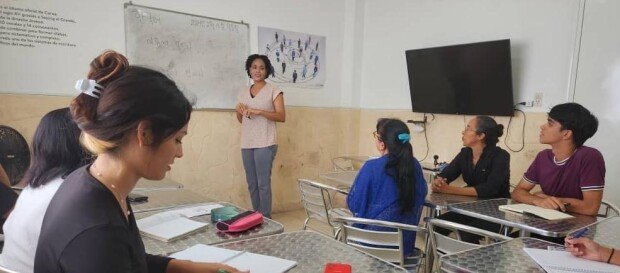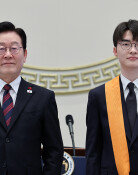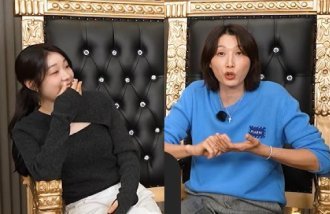Enthusiasm in the air at Cuban Korean language school
Enthusiasm in the air at Cuban Korean language school
Posted February. 17, 2024 07:37,
Updated February. 17, 2024 08:38

Lisette González (36), a resident of Havana, the capital of Cuba, expressed overwhelming joy upon learning about establishing diplomatic relations between South Korea and Cuba on Wednesday (local time). Having fallen in love with Korea 11 years ago and learned the language after watching the Korean drama ‘My Fair Lady’ on Cuban TV in 2013, González felt an overwhelming sense of satisfaction, believing that the two countries have finally become 'friends.'
"The students were also delighted, expressing, 'Can we go to Korea now? '" Mr. González, a teacher at a Korean language school in Havana, said on a phone call with The Dong-A Ilbo on Thursday. "I anticipate an increase in the number of Korean language teachers at schools, creating more opportunities for students."
The Korean language school where Mr. González teaches was established in 2022 with support from the Overseas Korean Foundation. Despite the small Korean community of about 30 residents in Cuba, the Havana Korean School boasts over 120 students learning Korean. Surprisingly, the number of locals proficient in Korean exceeds that of Korean residents. The student body includes individuals as young as 20; even an 85-year-old grandmother of Korean descent is diligently learning the language.
The popularity of the Havana Korean School is significantly attributed to the Korean Wave. Even before diplomatic relations were established, Korean music and dramas were trending topics in Cuba. Mr. González, who holds a degree in mass communication from the University of Havana, reflects this trend. While Cuba is renowned for cultural richness, including salsa and the film Buena Vista Social Club (2001), which garnered attention in South Korea, González notes, "People in their teens and 20s now prefer K-pop dance and excel at it." "The number of Koreans in Cuba was 60 to 70 before the pandemic, but has significantly decreased," Principal Jeong Ho-hyeon of the Korean School said. "However, Cuba's love for Korean culture is growing."
There are local expectations that the establishment of diplomatic ties with South Korea will bring positive impacts to Cuba's economy. Cuba has been grappling with unprecedented economic challenges, marked by soaring prices. Following the currency reform in 2021, the Cuban peso (CUP)-dollar exchange rate has surged more than 10 times in the unofficial market, posing challenges in acquiring daily necessities promptly. “Having lived in Cuba for 18 years, the inflation and economic difficulties we are currently facing are the most severe,” Principal Jeong said.
Hyoun-Soo Kim kimhs@donga.com



![8년전 한밤 중 목욕탕에 나타난 김정은, 분노한 이유는 [주성하의 ‘北토크’]](https://dimg.donga.com/c/138/175/90/1/wps/NEWS/IMAGE/2026/01/23/133210584.1.jpg)
![[광화문에서/김준일]단식 마친 장동혁… 중요한 건 단식 그 다음](https://dimg.donga.com/c/138/175/90/1/wps/NEWS/IMAGE/2026/01/23/133221688.1.jpg)
![라면 먹고도 후회 안 하는 7가지 방법[노화설계]](https://dimg.donga.com/c/138/175/90/1/wps/NEWS/IMAGE/2026/01/23/133219600.3.jpg)

